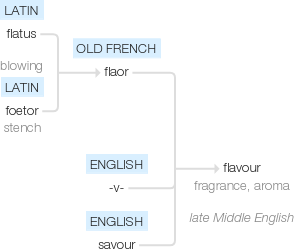Flavor
late Middle English (in the sense ‘fragrance, aroma’): from Old French flaor, perhaps based on a blend of Latin flatus ‘blowing’ and foetor ‘stench’; the -v- appears to have been introduced in Middle English by association with savour. flavour (sense 1 of the noun) dates from the late 17th century.
wiktionary
From Middle English flavour meaning "smell, odour", usually pleasing, borrowed from Old French flaour(“smell, odour”), from Vulgar Latin *flātor(“odour, that which blows”), from Latin flātor(“blower”), from flō, flāre(“to blow, puff”).
etymonline
flavor (n.)
c. 1300, "a smell, odor" (usually a pleasing one), from Old French flaor "smell, odor; action of smelling, sense of smell," probably from Vulgar Latin flator "odor," literally "that which blows," in classical Latin "blower," from flare "to blow, puff," from PIE root *bhle- "to blow."
"Not common before Milton's time" [Century Dictionary], and it is not clear what exactly Milton meant when he used it. The same Vulgar Latin source produced Old Italian fiatore "a bad odor." Sense of "taste, savor" is 1690s, perhaps 1670s; originally "the element in taste which depends on the sense of smell." The -v- in the English word is euphonic or perhaps from influence of savor. Flavor-of-the-month is from 1946 (originally of ice cream).
flavor (v.)
1540s, "communicate a distinctive quality to," from flavor (n.). Meaning "add a flavoring substance to" is from 1740. Earliest use was now-obsolete sense of "to smell" (early 15c.). Related: Flavored; flavoring.
